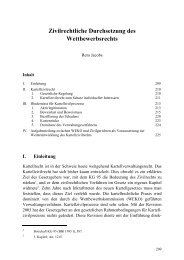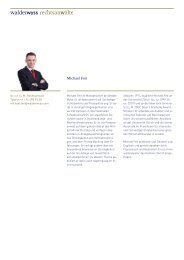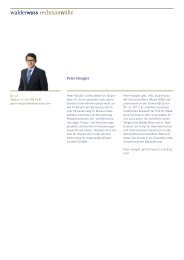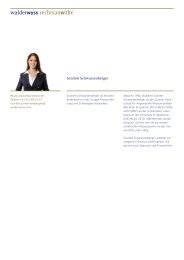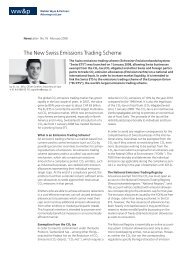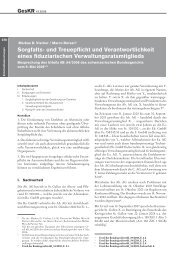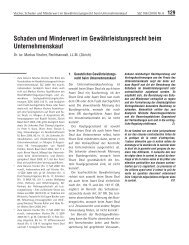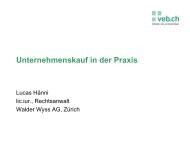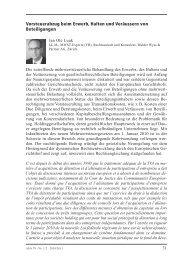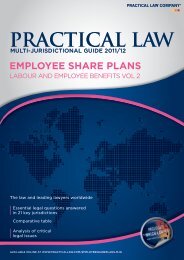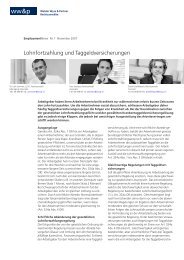Judgment of 7 March 2012 - Walder Wyss Ltd.
Judgment of 7 March 2012 - Walder Wyss Ltd.
Judgment of 7 March 2012 - Walder Wyss Ltd.
Create successful ePaper yourself
Turn your PDF publications into a flip-book with our unique Google optimized e-Paper software.
A-6537/2010<br />
instance has the same powers <strong>of</strong> adjudication as the lower instance. However, such rectification<br />
is excluded if the infringement <strong>of</strong> party rights is especially serious. Nor must it give rise to any<br />
detriment to the complainant, and rectification should be the exception rather than the rule (inter<br />
alia: judgment <strong>of</strong> the Federal Supreme Court BGE 133 I 201 cons. 2.2; decision <strong>of</strong> the Federal<br />
Administrative Tribunal BVGE 2009/53 cons. 7.3, 2008/47 cons. 3.3.4; A-2925/2010 <strong>of</strong> 25<br />
November 2010 cons. 1.2.2.3; Häfelin/Müller/Uhlmann, op. cit., ss. 1710-1711).<br />
2.<br />
2.1. The Swiss Confederation levies withholding tax on income generated by moveable capital<br />
assets (art 132(2) Federal Constitution and art 1(1). 1 WHTA [Federal Act on Withholding Tax,<br />
Verrechnungssteuergesetz, VStG]). This tax applies inter alia to interest, coupon payments,<br />
pr<strong>of</strong>it shares and other revenues from shares issued by domestic entities (art 4(1)(b) WHTA).<br />
The tax is payable by the debtor <strong>of</strong> the taxable payment (art 10(1) WHTA) and hence, in the<br />
case <strong>of</strong> income from shares, the company distributing the dividends. The taxable payment has<br />
the tax amount deducted from it upon being paid, transferred, credited to an account or <strong>of</strong>fset,<br />
without regard to the identity <strong>of</strong> the creditor. In the case <strong>of</strong> capital revenues the deduction is<br />
35% (art 13(1)(a) in conjunction with art 14(1) WHTA).<br />
2.2. Pursuant to art 24(2) WHTA legal entities are entitled to a refund <strong>of</strong> withholding tax if they<br />
had their seat in Switzerland at the time the taxable payment fell due. Under art 21(1)(a) WHTA,<br />
an entitled entity pursuant to art 22–28 WHTA is entitled to a refund <strong>of</strong> the withholding tax<br />
deducted by the debtor if that entity was the beneficial owner <strong>of</strong> the assets generating the<br />
taxable income at the time the taxable payment fell due. Under art 21(2) 2 WHTA a refund is<br />
not permissible in any case in which it might result in tax evasion.<br />
2.3. Whereas domestic entities may reclaim the withholding tax levied on income generated by<br />
moveable capital assets if they were the beneficial owner <strong>of</strong> those assets at the time the taxable<br />
payment fell due and if refunding the tax does not result in tax evasion (cons. 2.2), different<br />
conditions apply to foreign payment beneficiaries. They are entitled to a refund only if a double<br />
taxation convention (DTC) concluded between Switzerland and their country <strong>of</strong> residence so<br />
provides (decision <strong>of</strong> the Federal Administrative Tribunal A-813/2010 <strong>of</strong> 7 September 2011<br />
cons. 3.1; Maja Bauer-Balmelli, in: Zweifel/Athanas/Bauer-Balmelli [Ed.], Kommentar zum<br />
Schweizerischen Steuerrecht 11/2, Basel 2005 [hereinafter: Kommentar VStG], n. 55 ad art 21<br />
WHTA with refs.; Maja Bauer-Balmelli, Der Sicherungszweck der Verrechnungssteuer, unter<br />
besonderer Berücksichtigung der Erträge aus Beteiligungsrechten, Diss. Zurich 2001<br />
[hereinafter: Sicherungszweck], pp 167 et seq.; judgment <strong>of</strong> the Federal Supreme Court<br />
2A.239/2005 <strong>of</strong> 28 November 2005 cons. 2.2 with ref.). The reason for the difference in<br />
treatment is that, for foreign recipients, the withholding tax does not serve the purpose <strong>of</strong><br />
providing security but rather a fiscal or debit purpose (Bauer-Balmelli, Sicherungszweck, p 107).<br />
It follows that, in international situations, art 21(2) WHTA (tax evasion reservation) has no (or no<br />
direct) application (decision <strong>of</strong> the Federal Administrative Tribunal A-2744/2008 <strong>of</strong> 23 <strong>March</strong><br />
2010 cons. 3.3; cf. more tellingly decisions <strong>of</strong> the Federal Board <strong>of</strong> Tax Appeals 2003-159 <strong>of</strong> 3<br />
<strong>March</strong> 2005 cons. 3e/bb; leaving this question unresolved: judgment <strong>of</strong> the Federal Supreme<br />
Court 2A.239/2005 <strong>of</strong> 28 November 2005 cons. 3.3.3; cf. also Bauer-Balmelli,<br />
Sicherungszweck, p 174, who considers direct recourse to art 21(2) WHTA as completely<br />
inadmissible).<br />
For the reasons just mentioned, with foreign beneficiaries it is never a case <strong>of</strong> reimbursing the<br />
original withholding tax per se, but rather <strong>of</strong> quantitatively demarcating the powers <strong>of</strong> taxation <strong>of</strong><br />
the two countries (decision <strong>of</strong> the Federal Administrative Tribunal A-2744/2008 <strong>of</strong> 23 <strong>March</strong><br />
2010 cons. 3.3, with reference to Maja Bauer-Balmelli, Altreservenpraxis ein rechtliches<br />
Translation © <strong>Walder</strong> <strong>Wyss</strong> <strong>Ltd</strong>. 10 / 23



